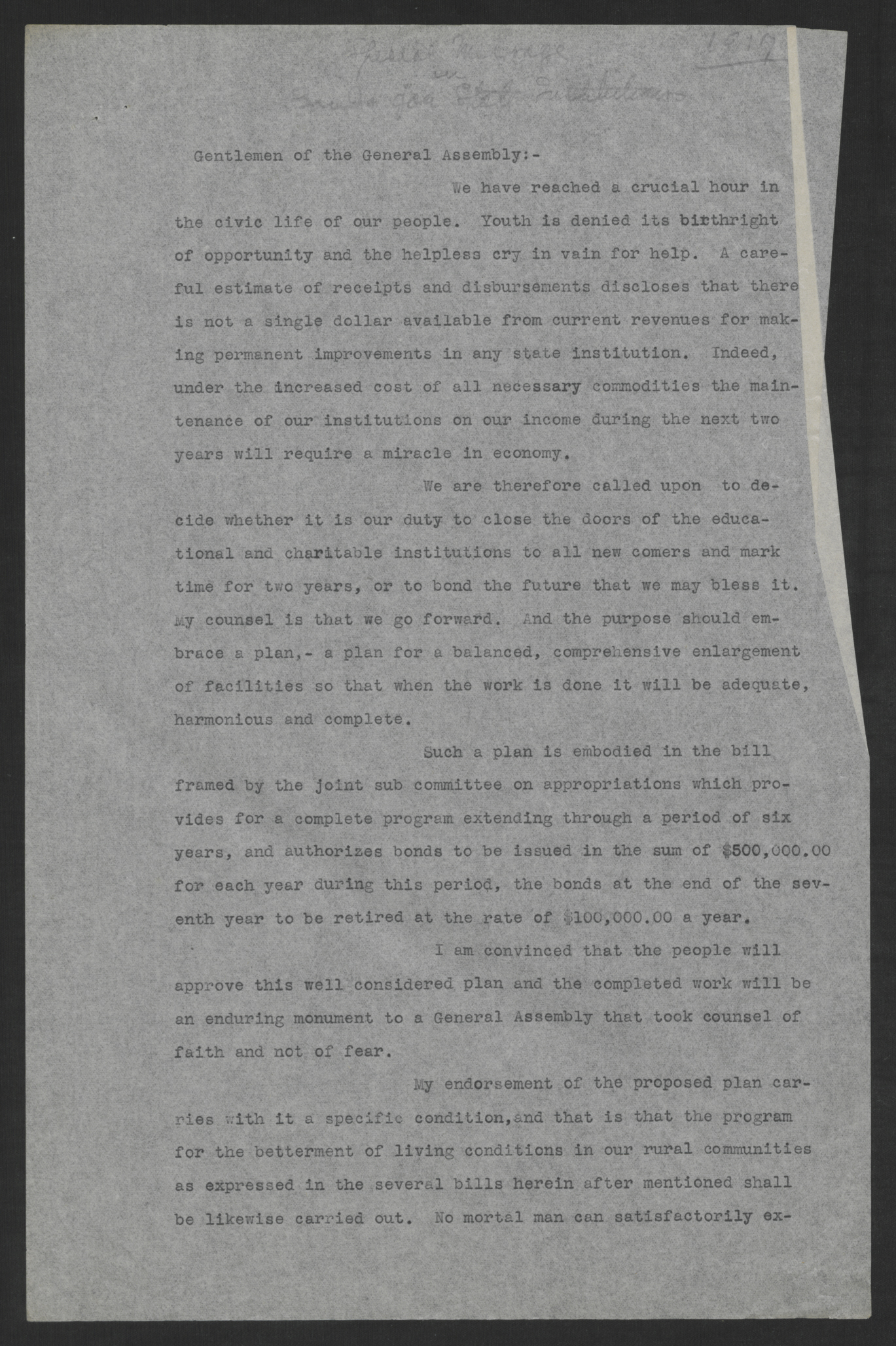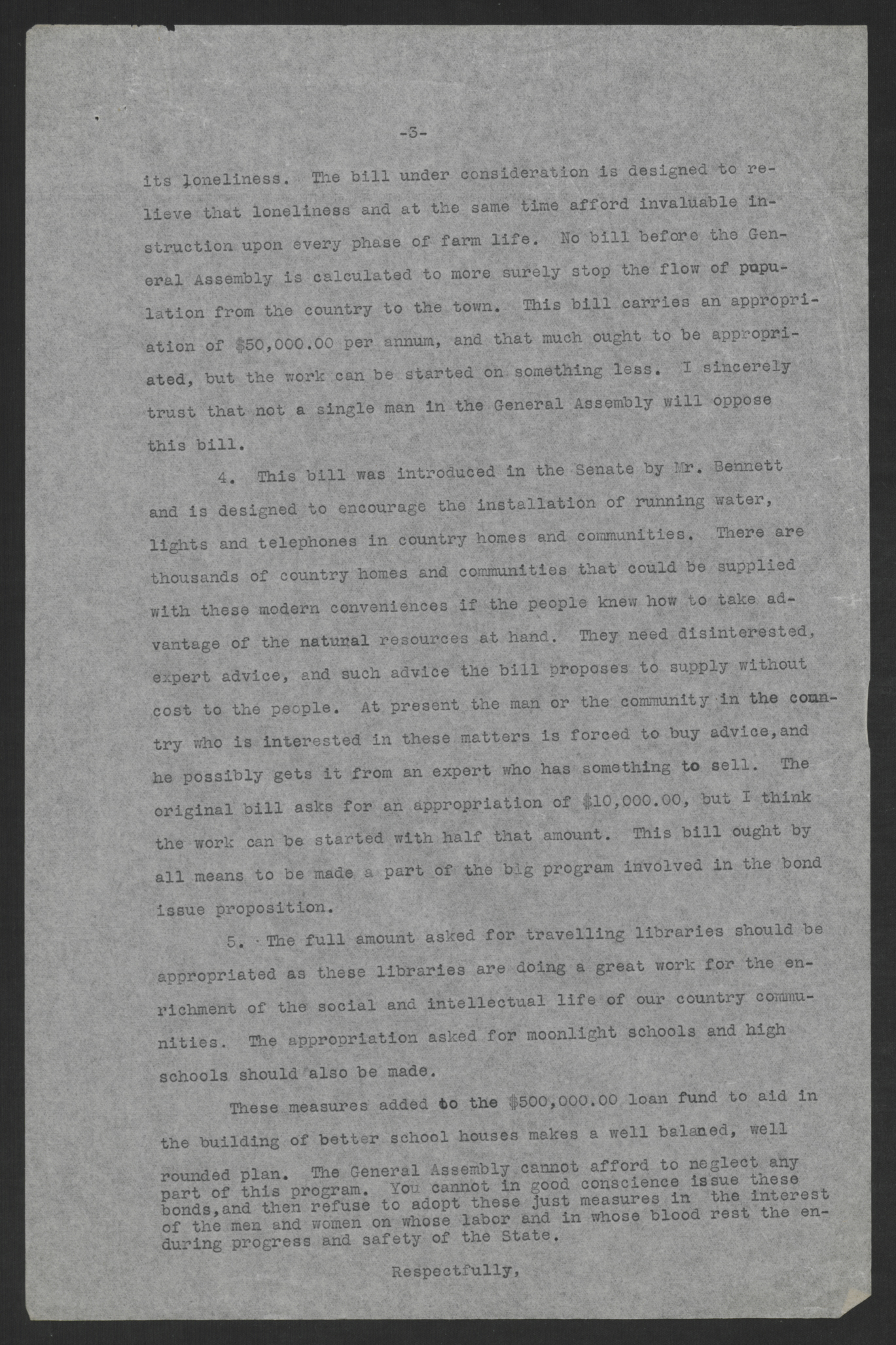<1917>
<Special Message
on
Bonds for State Institutions>
Gentlemen of the General Assembly:-
We have reached a crucial hour in the civic life of our people. Youth is denied its birthright of opportunity and the helpless cry in vain for help. A careful estimate of receipts and disbursements discloses that there is not a single dollar available from current revenues for making permanent improvements in any state institution. Indeed, under the increased cost of all necessary commodities the maintenance of our institutions on our income during the next two years will require a miracle in economy.
We are therefore called upon to decide whether it is our duty to close the doors of the educational and charitable institutions to all new comers and mark time for two years, or to bond the future that we may bless it. My counsel is that we go forward. And the purpose should embrace a plan,- a plan for a balanced, comprehensive enlargement of facilities so that when the work is done it will be adequate, harmonious and complete.
Such a plan is embodied in the bill framed by the joint sub committee on appropriations which provides for a complete program extending through a period of six years, and authorizes bonds to be issued in the sum of $500,000.00 for each year during this period, the bonds at the end of the seventh year to be retired at the rate of $100,000.00 a year.
I am convinced that the people will approve this well considered plan and the completed work will be an enduring monument to a General Assembly that took counsel of faith and not of fear.
My endorsement of the proposed plan carries with it a specific condition, and that is that the program for the betterment of living conditions in our rural communities as expressed in the several bills herein after mentioned shall be likewise carried out. No mortal man can satisfactorily explain to the people how a state could spend $1200,000.00 on these higher institutions of learning and then enter a plea of poverty to the cry of the unnumbered multitude who can never hope to enter a college door. The hope and the resolve of this administration is to bring to bleak and lonely lives a new breath of fragrance, a new touch of color, a new baptism of hope. To this end sundry bills have been introduced, and I urge that these be enacted as a part and parcel of the big movement for better living conditions in North Carolina.
1. This bill calls for the teaching of the a. b. c's of good farming in every country school. The bill has been carefully prepared, approved by everybody interested in the subject, was introduced by Mr. Swain in the House, has been favorably reported by the Committee on Education, and should by all means be enacted. The bill guarantees that the country boy who never rises above the fourth grade will know something of the mysteries of seeds and soils and in the cultivation of a one horse crop will be able to mix brains with dirt.
2. This bill provides for the physical examination of children who attend the public schools. It proposes to detect and arrest defects in the growing child before it is everlastingly too late. A defect treated in its incipiency will in many cases keep the child from becoming a permanent charge upon the state. Considerations of economy and humanity alike call for the passage of this bill. The bill carries a small appropriation of $15,000.00, and I am persuaded that the administration of this law will pay marvelous dividends upon the investment. The bill was introduced in the House by Dr. Crowson, has been favorably reported by the Committee on Education and Health, and I earnestly beg the General Assembly to make it a law.
3. This bill was introduced in the House by Mr. McLendon, and is designed to make the country school house the social center. I said in my Inaugural Address that the pathos of country life is its loneliness. The bill under consideration is designed to relieve that loneliness and at the same time afford invaluable instruction upon every phase of farm life. No bill before the General Assembly is calculated to more surely stop the flow of population from the country to the town. This bill carries an appropriation of $50,000.00 per annum, and that much ought to be appropriated, but the work can be started on something less. I sincerely trust that not a single man in the General Assembly will oppose this bill.
4. This bill was introduced in the Senate by Mr. Bennett and is designed to encourage the installation of running water, lights and telephones in country homes and communities. There are thousands of country homes and communities that could be supplied with these modern conveniences if the people knew how to take advantage of the natural resources at hand. They need disinterested, expert advice, and such advice the bill proposes to supply without cost to the people. At present the man or the community in the country interested in these matters is forced to buy advice, and he possibly gets it from an expert who has something to sell. The original bill asks for an appropriation of $10,000.00, but I think the work can be started with half that amount. This bill ought by all means to be made a part of the big program involved in the bond issue proposition.
5. The full amount asked for traveling libraries should be appropriated as these libraries are doing a great work for the enrichment of the social and intellectual life of our country communities. The appropriation asked for moonlight schools and high schools should also be made.
These measures added to the $500,000.00 loan fund to aid in the building of better school houses make a well balanced, well rounded plan. The General Assembly cannot afford to neglect any part of this program. You cannot in good conscience issue these bonds, and then refuse to adopt these just measures in the interest of the men and women on whose labor and in whose blood rest the enduring progress and safety of the State.
Respectfully,
[unsigned]




